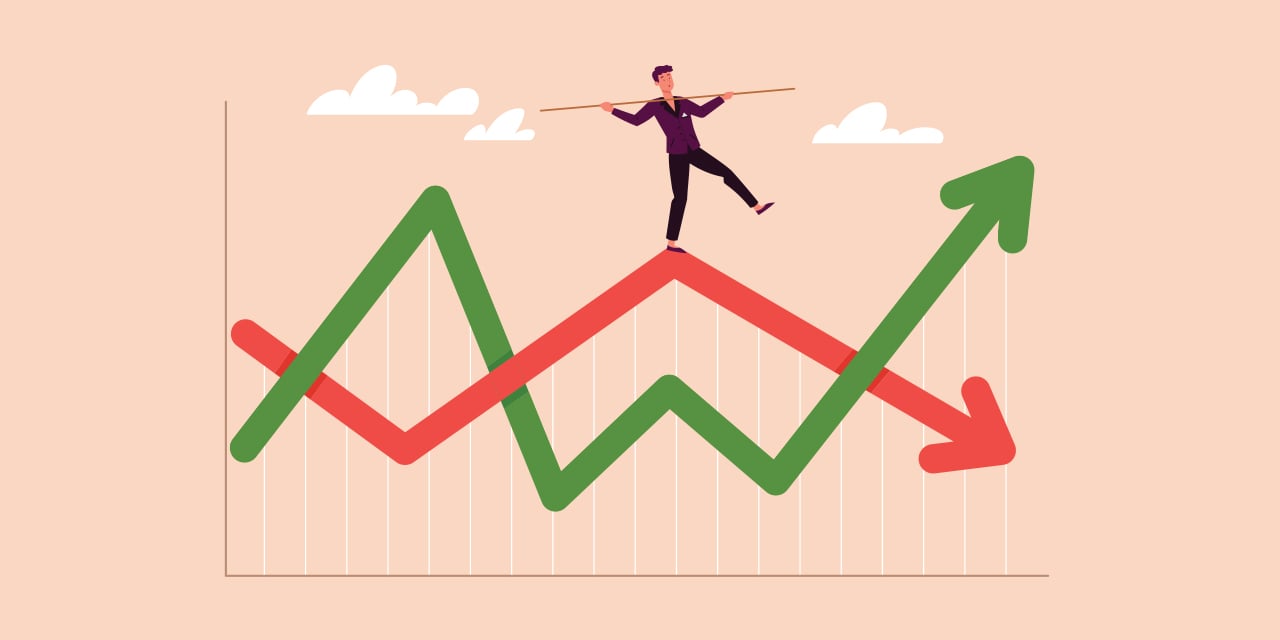
All That Matters: The Lay of the Land
In our debut episode of All That Matters, Mike Antonelli and Ross Mayfield characterize the first quarter of 2023, address client questions about de-dollarization and discuss what they like and don’t like about the market right now. Watch the below video or read the abridged summary to get the lay of the land from two of our market experts.
How would you characterize the first quarter of 2023?
Mike:
Let’s do some quick market returns:
- The Dow is up about 1% - not super great in the first quarter.
- The S&P up 7.5% - actually quite good for a quarter.
- QQQ, which is a tech heavy, growth stock heavy index – it’s up 20%.
- Small caps is up about 2.5%.
- A 60-40 diversified portfolio up about 5.6%.
So right now, we have back-to-back positive quarters in the markets. Ross, I'm going to give you some evidence-based insight, but will caveat that past performance is no guarantee of future results:
So the S&P gained greater than 7% in the first quarter of 2023. That's happened 16 times in history; each of those times, it turned out to be a positive year for the S&P. And – since the end of World War II – there’s been ten times the market has a positive first quarter after a low performing year. Each of those times, the rest of the year was positive. While we aren’t saying that this will happen this year, we are saying this is what happened in the past. So Ross, why do you think the market was up in the first quarter?
Ross:
I think you mentioned it. When big tech stocks and big growth are up significantly, the market is going to be up because these stocks carry such a big weight. Why have tech stocks done so well? I think there’s a couple reasons. For one, stocks fell so much last year that I think investors see it as an entry point for some high quality and dominant companies. But also, rates fell, particularly following Silicon Valley banking crisis; Short-term rates plummeted, and growth stocks tend to do better when rates are lower. We’ve seen this correlation a lot over the last few years. And so big growth, big tech dragged the market higher.
Mike:
Frankly the economic data wasn’t as bad as we thought. I think the case for a bear market – certainly at the beginning of 2022 – was that earnings were going to fall, the economy was going to drop, home prices are going to drop and people are going to start losing their jobs. And while the latter has happened in Silicon Valley, it
Ross:
Yeah, the early part of the year was significant economic growth, re-acceleration in the economy, consumers outspending, people getting jobs – all while inflation is coming down. Now, inflation is proving to be a little bit sticky, but it’s heading in the right direction and the economy hasn’t really cracked yet. Even the Silicon Valley banking crisis in mid-March did not really break the economy in a meaningful way, and stocks rallied into quarter end. There’s a lot of resilience in the market at the moment.
Is the US Dollar Weakening?
Ross:
The number one question I've gotten over the past couple weeks is on the status of the US dollar as a reserve currency. Is the world being de-dollarized at the hands of China, Russia, and Saudi Arabia? That’s by far the number one question that I've got. What's your take on that topic?
Mike:
It’s almost like a coordinated media story – it’s all over the place. And you have to ask yourself: how often does this happen? We talk about de-dollarization all the time, and my take is that this is just noise. There’s no data that supports de-dollarization or supports that the dollar is losing its reserve currency status. There’s no one market or one currency that’s big enough to support the world’s wealth. The United States provides assets to the world to invest in, and they do. We’re the biggest consuming nation in the world – we send people dollars, and they send us goods. These countries have to do something with those dollars.
Ross:
You’re absolutely right. 60% of the world’s currency reserves are US dollars still. It’s declined slightly over the past couple of decades, but it’s still 60%. The next closest is the euro at 20%. Then it’s the Japanese yen and the British pound – there’s a lot of US friends on the list before you get down to China, which is 1-3% and isn’t nearly as deep or liquid. So I see a world where the dollar loses a little bit of dominance over a longer period, but it’s not opinion that it will be replaced by the Chinese Yuan.
Mike:
Yeah, just try not to let too many headlines scare you out of a comprehensive financial plan, because these events are going to happen all the time. You’re going to see so many things, not only from the media, but also from your friends. I wrote a blog where I said the biggest danger to a financial plan is “They” – someone else telling you what to be afraid of.
Ross:
It’s the perfect story: it’s enemies on foreign shores, weaponizing our currency and assets. It’s the perfect thing to kind of spark fear amongst an audience base. And so you’re right – it’s going to come up again. We can talk about it in five years on this show when it happens again.
What aspects do you like about the economy right now? What do you not like?
Ross:
I also want to talk about US consumers. Over the past 18 months, we’ve faced a really tricky economic environment with high inflation and rising interest rates. But because we’ve had such a strong labor market, the consumer has not blinked. If you’ve been in an airport, it’s chaos. If you’ve been to a movie, it’s chaos. People are out and they’re spending. The consumer fuels our economy and while they might be unhappy about it, they’re still out and spending to this day.
Mike:
I do like the market’s resilience. We mentioned that there’s been a lot of bad news thrown at it, and it’s actually hung in there. I like that inflation is falling – you see it not only in the consumer data, but also in the producer data. I like that the housing market has stayed firm despite increasing mortgage rates. You start to see interest rates hitting the market when housing prices fall and when stock prices fall, but that just hasn’t happened.
That said, I’m not trying to be all rosy. There are other things: the economy is slowing, interest rates are high. There are things to worry about, right Ross?
Ross:
Yes. The manufacturing sector is in contraction. It’s not a big part of our economy, but it does drive a lot of activity. And while you mentioned that housing has held up really well in the face of high rates, people are still having trouble with affordability. The economy is slowing – and a recession is typically going to happen every six to eight years. I don’t think we’re going to see a very deep or lengthy recession, but it seems like we’re heading towards one right now, or at least some sort of economic slowdown.
Mike:
So you and I think the market is just going to bounce in a range for most of the year. Just when we get too high, the bearish comments show up; when we get to low, the bullish optimism shows. I don’t think the market’s trending to the upside all that much, but I also don’t think the downside is as bad as some people think.
Ross:
Not to hammer home the point, but the bearish critics had every single thing they could have wanted: a banking crisis, higher rates, sticky inflation and yet the market didn’t come close to retesting the lows from October 2022. The upside is tough – we need some sort of catalyst that is hard to find in the next couple of months – but I think the lows have been put in.
If you have additional questions on how the market might influence your portfolio and broader plans, your Baird Financial Advisor is only a phone call away. For more insight into managing your portfolio, check out our articles on bairdwealth.com and the latest issue of Digest.
The information reflected on this page are Baird expert opinions today and are subject to change. The information provided here has not taken into consideration the investment goals or needs of any specific investor and investors should not make any investment decisions based solely on this information. Past performance is not a guarantee of future results. All investments have some level of risk, and investors have different time horizons, goals and risk tolerances, so speak to your Baird Financial Advisor before taking action.

